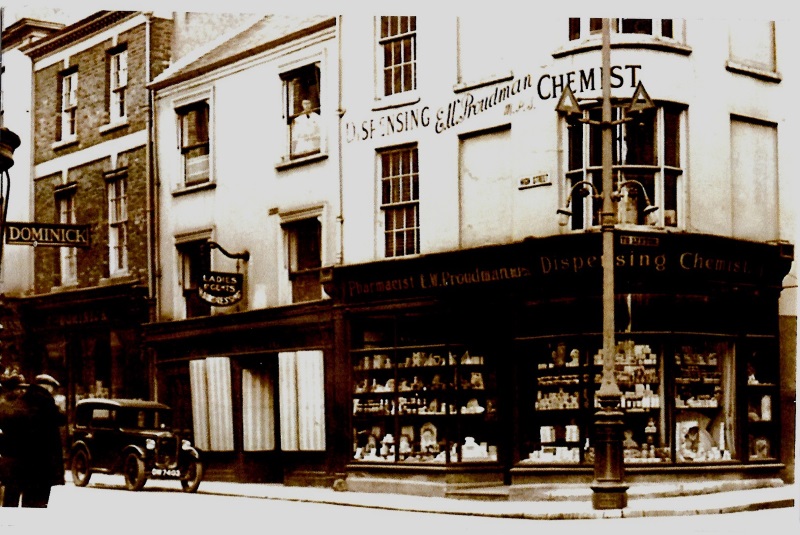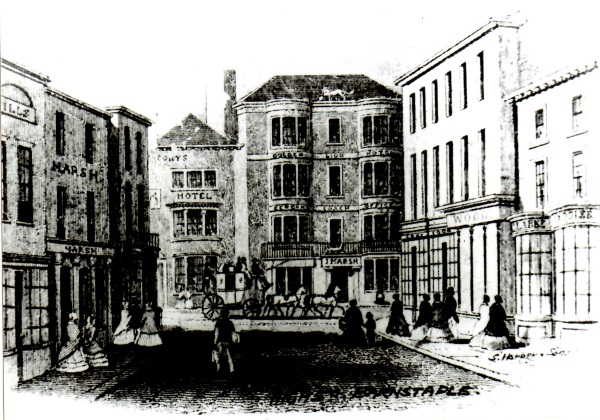The 1880 By-Election
|
 This photograph is of the building on
the corner of Barnstaple High Street where the Munro
children sat in an upstairs window in 1880 to watch the
ongoing events. It dates from some years later
(hence the car.) It is now a brick built building and
the shop on the High Street below it is Youing's sweet
shop. It still faces the Fortescue Hotel but the
Golden Lion that Ethel mentions is now a restaurant (The
Bank) The Golden Lion Tap, however, still exists
as it did in 1880, around the corner. In those days, it
was where where the servants and coachmen of the
gentry (who were dining in the Golden Lion) would have
their refreshments, after parking their
vehicles.
Thanks to Michael and Lyn Essery for this photograph and to the British Newspaper Archives for Newspaper reports |
The Barnstaple By-Election of February 1880.
The quote below comes from The Square Egg, the biography of Hector Hugh Munro written by his sister, Ethel M. Munro. Sadly, she destroyed his papers after his death, and so her biography is the only record we have of his childhood.
She wrote a few brief lines about the election, which took place when Hector was ten.
“From about seven years old he was a keen politician, There was a most exciting election in Barnstaple, when Lord Portsmouth's son, a Radical, was elected. We were taken to the town to hear the poll declared and had seats in a window opposite “The Golden Lion”. The sights we saw were far too thrilling and Hector was in a fever of excitement and furious at the result of the poll. He remained a Conservative all his life.”
There is a North Devon Journal report of the Election, and although it has no illustrations, once you have read it you can almost believe you have been there, on this exciting day. You can picture the scene, with the dashing Countess, Lady Portsmouth, at the reins of her carriage – horses festooned with rosettes and ribbons – as she wheels her horses expertly past another carriage in the High Street (no pedestrian precincts in those days!) You can see her on the box, with her daughter, Lady Catherine Milnes Gaskell, and in the carriage, her passengers, Lady Dorah Wallop, and the candidates, Lord Lymington, her son, and Mr Cave, all waving to the adoring crowds.
It seems that beyond all else, the Countess and her daughter were the stars of the day. As Mr Cave said later, to laughter from the assembled crowd at the Music Hall, “ There is one thing I am very thankful for besides this victory. I never voted for Female Suffrage, and I'm blessed if I ever do. Why, if Lady Portsmouth and her daughter Lady Gaskell, were to oppose Lord Lymington and myself, we should be nowhere.”
This was a day of triumph for the Barnstaple Liberals, and no doubt the Manning family were among those celebrating. It is likely that Benjamin was ill at the time. In an advertisement later in the year he announced his recovery and return to business following a “severe and protracted illness,” and it was his son William, rather than Benjamin, who was one of those who nominated Lord Lymington before the election. However, Benjamin may have been watching some of the activities from his house, or even his bedroom window, in Joy Street, most especially the commotion when an injured man was carried into a house nearby, and Lord Lymington and Mr Cave came to pay their respects.
Colonel Hibbert was among those who nominated Sir Robert Carden, and so for the Hibberts, as well as Hector, it ended up as a day of disappointment. As is the way with politics, and life in general, they were to have their day of cheer in April when Sir Robert, despite his age, 80, had his great victory in the General Election. The mug in our Museum Display commemorates that victory – we wonder if the Munros, or the Hibberts, would have purchased one?
If the Journal report of Carden's victory event was not so euphoric, that may be because the Journal was a Liberal newspaper. Unfortunately the North Devon Herald which supported Sir Robert's party, is not yet digitised, and we haven't found their account, as yet.
What we would most love to find, though, is a record showing that the Mannning family and the Hibbert and Munro families had some form of interaction between one another, on that day. The Munros were sitting in a window opposite the Golden Lion. That Inn no longer exists, but was next door to the Fortescue, which is where Lord Lymington addressed the crowds from a balcony after the result had been announced. We know that the Munros and Hibberts socialised with one another, but could it be that after the result Colonel Hibbert tipped his hat to Benjamin's son William, among others, in acknowledgement of the Liberal success?
The Mannings, and the other two families, came from very different social classes, but they all breathed the same air, and shared in the excitement of this day. They all contributed, in their own different ways, to the history of their town.
Colonel Hibbert was later to become a Mayor of Barnstaple, and Hector Hugh Munro is remembered world-wide for his short stories, but Benjamin Manning would no doubt be rather pleased to know that, while there is no Hibbert or Munro street in Barnstaple, there is a Manning's Way – and of course , Manning's Pit.
More about the local North Devon newspapers of the Victorian era.  Thanks to Michael and Lyn Essery for the above photograph. They have a regular stall at Barnstaple Pannier Market with a wonderful collection of old photographs and books about Barnstaple Local History. |